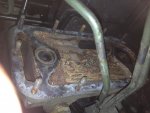Rustygears
New member
- 394
- 6
- 0
- Location
- Ramona, CA
You have indicated the classic symptoms of a blown head gasket and it is mechanics 101 for any engine, not just a multifuel or diesel. If you have "two pints of AF in the pan" then this is a pretty severe leak and a dangerous situation. That much AF would have me worried that AF may also getting into the cylinder bores and could wind up busting a rod, etc. at start up.
While changing the head gasket is a PITA, it is a lot easier than a rebuild for a broken rod.
While changing the head gasket is a PITA, it is a lot easier than a rebuild for a broken rod.




